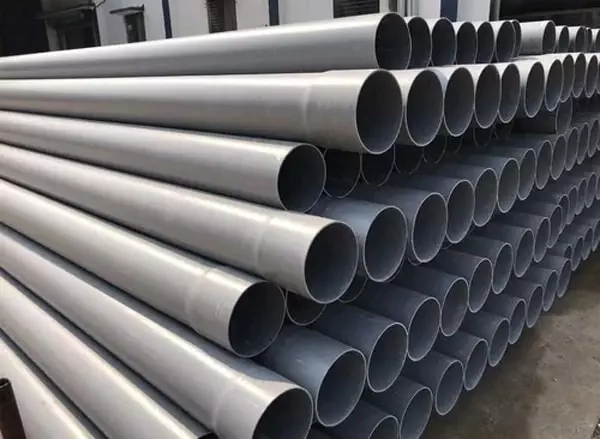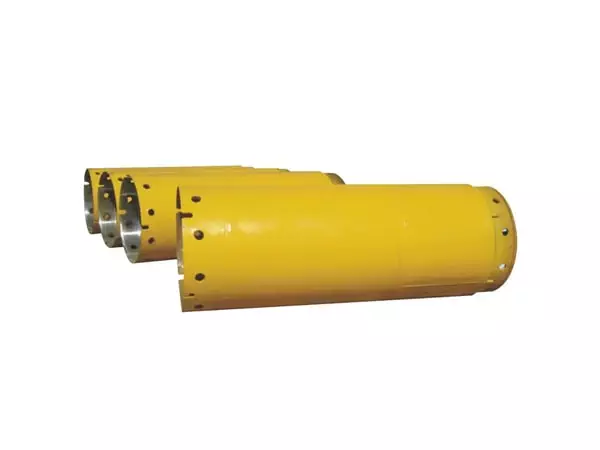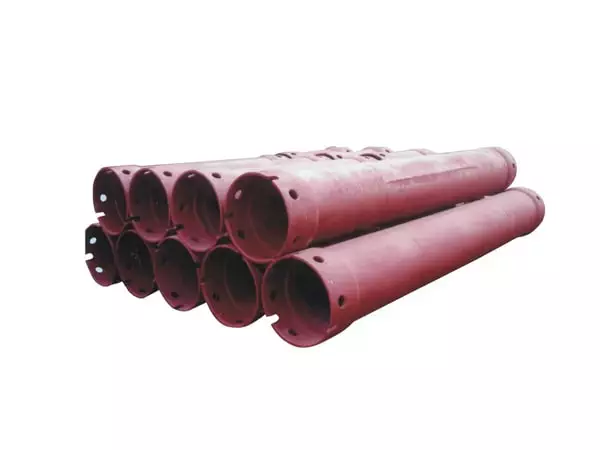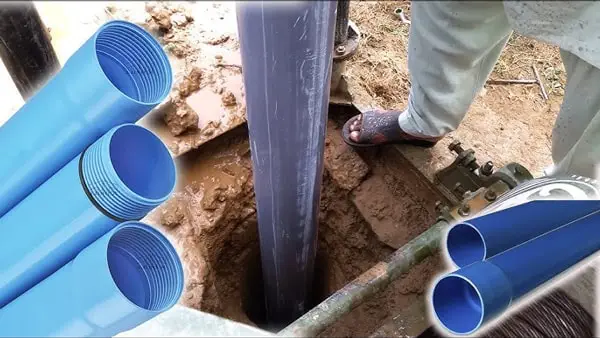With the need to protect utility lines as well as the integrity of construction works, casing pipes are indeed key components of the project. This is why, whether you are in the oil and gas sector, constructing water wells, or geotechnical applications, the selection of the right casing pipe is fundamental.
In this blog, we’ll explain in detail the various casing pipes available in the market, their different materials, their applications, and many more so that you are well-informed and prepared for your subsequent project!

1) Understanding pipe casing
Casing pipe which is also referred to as encasement pipe consists of hollow steel tubes of large diameter. These are used in oil well drilling and other subsurface construction activities. They are put into boreholes or augered holes for the provision of structural stability, protection, and support of utility lines or well components.
2) Purpose of Casing Pipes
Casing pipes are important not only in the process of drilling but also in utility works. They provide the necessary links with the drilling unit to prevent collapsing during the drilling process. In utility works, casing pipes encase product lines such as steel, air, and electrical pipes, which have utility.
So, this enclosure guarantees that these plugs are not damaged due to overburdened soil pressure, unstable ground, or external forces.
In heavy-duty horizontal boring, casing pipes can be placed in more than two pieces into augmenting openings. And then, they are connected by welding or coupling them. These segments can be placed in a ready-made ribbon which is pulled through augmented holes under highways, railways, lakes, or rivers.
A customized casing pipe, acting as a protective barrier, controls the fluid flow preventing the pollution of groundwater resources as well as ensuring the safety of the well. They protect the pipelines and the utility lines for continued and dependable operation.
3) Types of Pipe Casing Materials
Pipe casing comes in various types, some important of which are discussed here;
- Steel Casing Pipe: Steel casing is both strong and durable allowing the winning strain and the internal or external pressure to be buffered rather easily. There is no doubt they are largely used on utility lines and outgoing pipelines across challenging terrains. Moreover, steel’s mechanical properties particularly the strain potential and stress strength are ideal for water, gas, and oil projects. As you know in these projects longevity of the material is required. Apart from this, casings made of steel are often lined or coated to avoid corrosion so that they can survive even in the worst conditions.

- PVC Casing Pipe: The PVC material has proven effective in ensuring that the casing pipes are corrosion-resistant, lightweight, and cost-friendly. It makes them the most appropriate for drainage systems. They are also less demanding in relation to mechanical strength and can easily be fixed to areas that require more chemical resistance instead. Due to the relatively low strength requirements in comparison to steel, PVC is predominantly used in non-pressurized piping systems.
- Other Materials: However, materials such as wood, concrete, and fiberglass serve peculiar functions. Armed with superb weight characteristics, fiberglass does a great job of preventing corrosion. Moreover, concrete adds weight and stability to large structures. Meanwhile, wood is preferred less among materials due to its appropriate use in temporary setups or different temperatures.
4) Steel Pipe Casing Options
The need for steel pipe casing has been on an upward trend. It implies that there are many different grades, diameters, sizes, and wall thicknesses available to suit whatever purpose is needed. The standard diameter range is from 4 inches to as wide as 60 inches, while wall thicknesses are only determined on a case-by-case requirement.
To ease the installation process, the ends of steel casing pipe may be welded, threaded, and coupled, or have trimmed ends. In trenchless construction methods such as pipe ramming and micro tunneling, steel casing pipes are thrust through the soil to form passages for utilities with no open trenches required.
Also, the rotary drilling rig casing of Everstar is to sustain collapsed boreholes when drilling operations. These casings are used in the oil and gas industry and even in underground construction works to help sustain structural failure and environmental safety.

5) Factors to Consider When Choosing Pipe Casing
Specific parameters have to be taken into account whenever choosing pipe casing. A planned decision will encompass durability, efficiency, and performance over the long term. So, what should these factors be? Let’s discuss:
- Utility Line Type: The choice of casing depends on the type of utility line being protected such as water pipes, air lines, or electrical cables.
- Environmental Conditions: The environmental surrounding has to be evaluated. The type of soil, level of groundwater, temperature changes, and some corrosive conditions may limit the effectiveness of the casing performance.
- Depth and Length Requirements: The depth and length of the casing clearly indicate what size, strength, and thickness type of the pipe will be used. With deeper or longer installations, stronger materials may be needed in order to withstand more pressure.
- Installation Method: The case of a trenchless construction for instance pipe ramming, pipe jacking, microtunneling or open-cut excavation determines what type of casing will be used. Steel casing pipes are usually preferred for trenchless methods, due to their strength and durability.
6) Installation and Maintenance Considerations
There are two principal ways of Installing a pipe casing:
- Trenchless Construction: This is a more flexible approach than the general practice of building trenches. The use of rammed pipes whereby holes are drilled or horizontal drilling is undertaken. It is so that a pulled pipe can be made through the hole. It makes this technique useful for crossing roads, railways, or even rivers.
- Open-Cut Excavation: This has numerous steps which include: first digging a trench second placing the casing pipe over the trench and finally filling the trench. Connecting pipes through the use of threads or welding is commonplace at this moment. However, this technique is also very suitable in areas where there are few restrictions in regard to excavation or digging.
- Maintenance Requirements: In protecting casing pipes, maintenance is very important since longevity is increased in this way:
- Routine Care: Periodically check the pipe for any signs of cracks rust, or damage.
- Clearing: In order to keep the pipe free from any obstructions, accumulated dirt, and other materials, they must be flushed out regularly.
- Coatings: It would be best to use coatings on steel pipes to prohibit the formation of rust.
- Timely Repairs: Over time, small damage can turn into major ones. Hence, it should be fixed properly as soon as it appears.
- Replacement: Any of the damaged sections can be changed if repairing is not possible.
7) Applications of Casing Pipes
Pipe casings are used in many industries; some of them are discussed below:
- Oil and Gas Industry: They provide wellbore structure support to avert collapse, manage pressure as well as avoid zone intermixing. And, this fosters effective drilling processes.
- Water Wells: Where there are water wells, casing pipes act as barriers to the underground water supply against contamination. Apart from thus, they protect structures collapsing and also ensure there is adequate water supply for the well or structure.
- Construction and Geotechnical Applications: Soil casing pipes are applied in the construction process so that the foundation and structures are not affected by soil conditions. They also enhance deep foundation work, such as pile driving and weak soil stabilization.
- Mining & Infrastructure projects: In infrastructure projects, casing pipes safeguard cables in tunnels, bridges, and urban installations, ensuring durability and resistance to environmental wear over time.
- Fiber optic cables: Casing pipes protect fiber optic cables by securing them in boreholes and shielding them from harsh underground conditions like moisture, heat, and physical damage.

8) Procuring the Right Pipe Casing
These causes should be taken into account in order to avoid problems while performing the work and loss of capital. It will definitely bevel to improve the balance between cost, quality, and performance of casings.
- New vs. Used Pipe Casing: Pipe casing could be gotten new or old. New casing assures standards and satisfaction whereas old casing is cheaper. However, old casing spacer pipes require testing.
- Suppliers and their sources: You can obtain pipe casing from different manufacturers and distributors. One such supplier is Everstar Machinery, which sells a variety of casings depending on project requirements.
- Procurement Activity: The process of procurements consists of the comparison of the prices of goods, the lead time, and the product features. It is very vital to choose the casings that are appropriate for the project in terms of the materials, sizes, and strength required for the structures.
- The Customized Casing: Pipe casing might be modified by further coatings and linings in accordance with more general requirements of the project, such as corrosion resistance or protection from chemicals. You can avail of such opportunities from Everstar Machinery Supply without any hesitation.
9) Conclusion
To sum it up, casing pipes are the life savers when it comes to the security of utility lines and aid in maintaining strength in the industries. Industries like oil and gas, construction, water wells, and others. Choosing the right casing in terms of material, size, and how it will be installed greatly impacts the eventual outcome after the casing is fixed. Proper purchases, whether new or used, as well as customization add to their efficacy.
Would you like to inquire more about casing pipes and their uses? If yes, reach out to Everstar Machinery and get professional assistance and personalized solutions for your project. We are ready to supply both new and preowned casing pipes that are of high quality and suited to your project requirements. So, reach out to us and get started right away!
